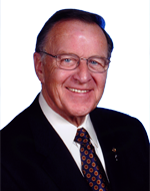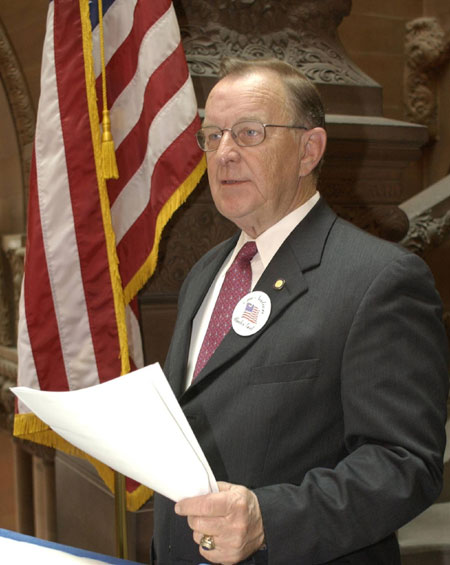Assemblyman McDonough Honors the Flag, Country and Military
Calls for support of legislative resolution to keep the words ‘under God’ in the pledge
Assemblyman David G. McDonough (R,C,I-Merrick) and fellow members of the Assembly today led a public recitation of the Pledge of Allegiance at the state Capitol in Albany in honor of the 50th anniversary of the pledge and American troops fighting terrorism. The event was designed to recognize the important role the pledge plays in the national identity, and was a show of support for a bi-partisan legislative resolution to keep the words "under God" in the pledge.
"Many men and women gave their lives to the establishment and growth of this great country, and continue to do so with the current war on terrorism. These selfless acts of courage and sense of duty have allowed us, as a nation, to enjoy the many freedoms we now possess," said Assemblyman McDonough. "The removal of ‘under God’ from the Pledge of Allegiance would alter a tradition that honors our flag, our country and our military servicemen and women."
The legislative resolution, sponsored by Assemblyman Jim Tedisco (R,C-Schenectady-Saratoga) and Assemblyman Chris Ortloff (R,I,C-Plattsburgh), memorializes Gov. George Pataki, the United States Congress, President George W. Bush, and the United States Supreme Court to proclaim that the words "under God" should remain a part of the Pledge of Allegiance.
The Assembly event comes on the heels of the decision of the village board of East Nassau, Rensselaer County, to abstain from reciting the Pledge at board meetings in the interest of saving time. The 31-word pledge takes an average of 11 seconds to recite.
The United States Supreme Court is currently considering whether the pledge should be banned from public schools because of the words "under God." According to a recent Associated Press poll, nine out of 10 Americans support the reference to God in the Pledge.
The proposed resolution also recognizes the insertion of "under God" into the pledge by declaring June 14, 2004 as the 50th anniversary of the current version of the Pledge of Allegiance, and proclaims June 14 as Pledge of Allegiance to the Flag Day in New York state.
In 1963, the Supreme Court ruled that referring to God in the Pledge of Allegiance is a simple recognition that the United States is historically believed to have been founded "under God." Furthermore, the courts ruled that schoolchildren are not required to recite the pledge or include the reference to God when saying the Pledge of Allegiance. Congress unanimously added the words "under God" in 1954. The original pledge was written in 1892.
Following is the resolution introduced by Assemblymen Ortloff and Tedisco:
WHEREAS, the United States of America was founded upon the revolutionary principle that each person’s human rights are inalienable; endowed by a higher power as inherent and indivisible aspects of the nature of every human on earth; rights that cannot be taken away; rights that have been honored and protected since the days of our founders by acknowledging and recognizing God as their source, and
WHEREAS, the First Amendment of the Constitution embodies principles intended to guarantee freedom of religion, both through the free exercise thereof and by prohibiting the government establishing a religion, and
WHEREAS, the Pledge of Allegiance was written by Francis Bellamy, an editor and clergyman, and was first published on September 8, 1892 in "The Youth’s Companion," a children’s magazine where he worked, and
WHEREAS, after a proclamation by President Benjamin Harrison, the pledge was first used in public schools on October 12, 1892 during Columbus Day Observances, and
WHEREAS, in 1954, following a grass-roots campaign led by the Knights of Columbus, President Dwight D. Eisenhower and Congress added the words "under God" to the Pledge of Allegiance to reaffirm that the United States is a country where all rights derive from God, not from government, and are therefore truly inalienable, and
WHEREAS, on June 14, 1954 the Pledge of Allegiance was officially recited across the United States with the phrase, "One Nation under God," and
WHEREAS, the United States Supreme Court ruled in an eight-to-one decision written by Justice William Brennan in School District Abington Township V. Schempp (1963) that "the reference to divinity in the revised Pledge of Allegiance…may merely recognize the historical fact that our nation was believed to have been founded ‘under God,’" and
WHEREAS, the Pledge of Allegiance is a recognition of the fact that the overwhelming majority of people believe in the values traditionally placed on the role of religion in our founding and our culture, and
WHEREAS, the United States Congress and the United States Supreme Court recognize the right of those who do not share in any or all of the beliefs expressed in the pledge to refrain from its recitation, and
WHEREAS, the Supreme Court is considering reversing the United States Court of Appeals for the 9th Circuit ruling that the phrase "under God" is an unconstitutional endorsement of religion, now therefore be it
RESOLVED, that it is the sense of this Legislative body in the State of New York that the Pledge of Allegiance, including the phrase "One Nation under God," reflects the fundamental revolutionary concept that human rights and political rights come not from government but from God, and be it further
RESOLVED, that this Legislative body pause in its deliberations and respectfully memorialize Governor George E. Pataki, the United States Congress, and President George W. Bush to proclaim that the phrase "One Nation under God" should not be altered from the Pledge of Allegiance, and be it further
RESOLVED, that this Legislative body pause in its deliberation to memorialize Governor George E. Pataki to recognize and honor June 14, 2004 as the fiftieth anniversary of the current rendition of the Pledge of Allegiance and proclaim June 14 as "Pledge of Allegiance to the Flag Day" in New York State.

